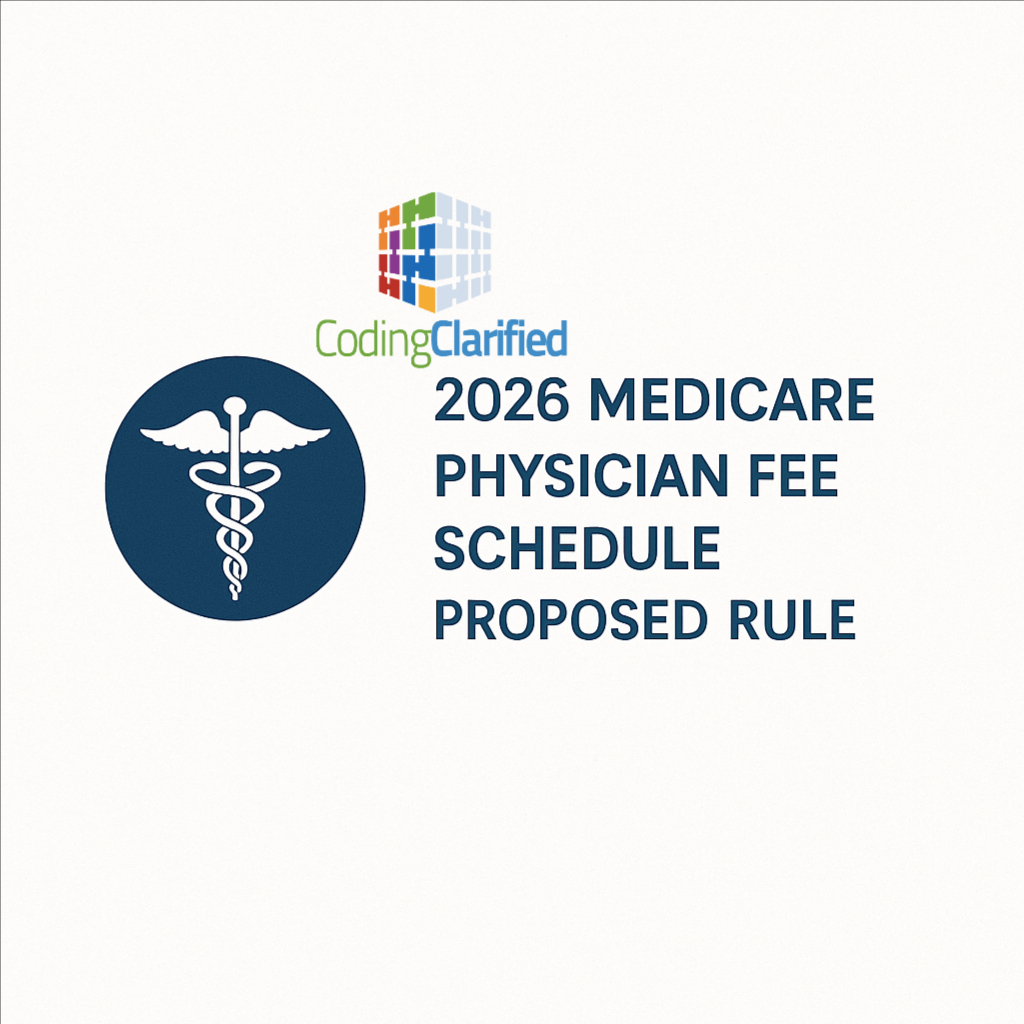2026 Medicare Physician Fee Schedule Proposed Rule: Key Medical Coding and Reimbursement Updates
The Centers for Medicare & Medicaid Services (CMS) released the 2026 Medicare Physician Fee Schedule (PFS) Proposed Rule (CMS-1832-P), unveiling several impactful changes for providers, coders, and billers. From RVU adjustments to expanded telehealth coverage and documentation standards, these updates have broad implications for how services are reported and reimbursed.
Conversion Factors: Two-Tiered System
For the first time, CMS proposes two separate conversion factors:
-
$33.59 for clinicians in Advanced APMs
-
$33.42 for those in MIPS or FFS only
This split reflects statutory increases (+2.5%) and an added 0.55% adjustment to offset new RVU reductions. These figures represent a 3.6–3.8% increase in reimbursement rates compared to 2025.
Work RVUs & Efficiency Adjustment
CMS proposes a controversial 2.5% efficiency adjustment to work RVUs for non–non-time-based services (e.g., procedures, imaging, diagnostics). Time-based services, such as E/M visits, behavioral health, and telehealth, are exempt, favoring specialties focused on ongoing care and chronic management.
Practice Expense RVU Revisions
The rule modifies how practice expense (PE) RVUs are calculated to better reflect differences between office-based and facility-based costs. This could shift how certain services are valued and reimbursed, especially as CMS proposes using hospital outpatient data to determine rates for services like radiation oncology and remote monitoring.
Expanded Telehealth Policies
CMS is proposing several permanent changes to telehealth that benefit providers:
-
Simplifies the telehealth services list process from 5 steps to 3
-
Removes the provisional/permanent distinction
-
Adds new services including:
-
Group behavioral counseling for obesity
-
Multi-family psychotherapy
-
Osseointegrated sound processor codes
-
-
Deletes SDOH Risk Assessment (G0136)
-
Eliminates frequency limits for inpatient, SNF, and critical care telehealth
-
Continues audio-only telehealth coverage for FQHCs/RHCs through 2026
-
Makes virtual supervision using real-time audio/video permanent for most services (except audio-only)
Telemedicine/Telehealth 2025 https://codingclarified.com/telehealth/
Medical Coding and Billing Guidelines for Social Determinants of Health (SDOH) https://codingclarified.com/medical-coding-and-billing-guidelines-for-social-determinants-of-health-sdoh/
Teaching Physician Policy Update
CMS plans to end the PHE-era flexibility, allowing remote presence of teaching physicians in metropolitan areas. In-person presence will be required once again in urban MSAs, although rural exceptions remain in place.
Behavioral Health Add-Ons
To further support integrated behavioral care, CMS introduces add-on G-codes for:
-
Primary care teams incorporating behavioral health
-
Collaborative Care Model (CoCM) expansion
There’s also expansion of Digital Mental Health Treatment (DMHT) coverage to include ADHD-focused devices, with a request for stakeholder feedback on broader digital therapeutics.
MIPS & Quality Reporting Updates
-
The MIPS performance threshold remains at 75 points through 2028
-
Expands MIPS Value Pathways (MVPs) and introduces a new Health & Wellness improvement activity subcategory
-
New reporting expectations may impact how coders support providers with documentation and quality measures
Additional Noteworthy Proposals
-
Permanent remote supervision coverage for teleradiology
-
Skin substitute reform to treat these products as incident-to supplies to reduce fraud
-
Ambulatory Specialty Model (ASM) pilots mandatory specialty-specific value-based care for heart failure and back pain beginning in 2027
What This Means for Medical Coders
-
Stay updated on new HCPCS/CPT codes for telehealth and behavioral services
-
Watch for reimbursement shifts in procedural vs. time-based service coding
-
Ensure virtual supervision rules are clearly documented in clinical records
-
Prepare providers for documentation needs tied to MIPS performance and new MVPs
Comment Deadline & Next Steps
The comment period for the 2026 PFS Proposed Rule closes on September 12, 2025. The final rule is expected later this fall, with implementation beginning January 1, 2026.
Calendar Year (CY) 2026 Medicare Physician Fee Schedule (PFS) Proposed Rule (CMS-1832-P) https://www.cms.gov/newsroom/fact-sheets/calendar-year-cy-2026-medicare-physician-fee-schedule-pfs-proposed-rule-cms-1832-p

